200+ Action Verbs for Resumes (Grouped by Impact)
Using powerful action verbs for resumes in 2025 is key to transforming your job descriptions into compelling achievements. Action verbs energize your bullet points, capture recruiter attention, and improve ATS ranking by clearly showcasing your contributions and skills.
| What to Do (Short Checklist) |
|---|
| Use strong, specific action verbs to begin bullet points |
| Group verbs by impact to tailor language for each role |
| Avoid weak or passive verbs like “responsible for” |
| Customize verbs to fit job descriptions and quantify results |
| Test resume readability and ATS parsing |
Who This Guide Is For
This comprehensive list is designed for all job seekers—entry-level, mid-career, and senior professionals—looking to refresh and power up their resume language. It is especially helpful for those optimizing resumes for ATS or aiming to improve clarity and impact.
200+ Action Verbs for Resumes (Grouped by Impact) — Definition & Purpose
Action verbs are concise, dynamic words that describe your accomplishments and activities. Grouping them by impact helps you choose the right tone and strength depending on your role and achievement level.
Categories Include:
- Leadership & Management
- Creative & Innovative
- Analytical & Research
- Technical & IT
- Communication & Collaboration
- Sales & Marketing
- Project & Operations Management
- Customer Service & Support
- Financial & Administrative
Best-Practice Rules (Do / Don’t)
| Do | Don’t |
|---|---|
| Start bullet points with powerful verbs | Use generic verbs like “did” or “helped” |
| Match verbs to the role and industry | Overuse the same verbs repeatedly |
| Combine verbs with quantifiable achievements | Use vague or passive phrases |
| Revise verbs to tailor each job application | Neglect updating verbs during customization |
Examples by Level & Industry
Leadership & Management
- Led, Directed, Orchestrated, Coordinated, Delegated, Supervised, Motivated
Creative & Innovation
- Designed, Developed, Conceptualized, Authored, Innovated, Launched
Analytical & Research
- Analyzed, Audited, Evaluated, Researched, Tested, Assessed
Technical & IT
- Programmed, Engineered, Debugged, Automated, Implemented, Secured
Communication & Collaboration
- Presented, Negotiated, Facilitated, Consulted, Advocated, Mediated
Sales & Marketing
- Prospected, Marketed, Promoted, Generated, Converted, Expanded
Project & Operations Management
- Planned, Executed, Streamlined, Budgeted, Monitored, Optimized
Customer Service & Support
- Assisted, Resolved, Advised, Supported, Handled, Trained
Financial & Administrative
- Budgeted, Forecasted, Reconciled, Organized, Documented, Processed
How to Customize Action Verbs to a Job Description
- Highlight verbs used in the job posting.
- Choose action verbs that mirror the role’s key responsibilities.
- Pair verbs with measurable outcomes or specific results.
- Replace generic verbs in your resume with stronger, targeted equivalents.
- Keep the language natural and avoid keyword stuffing.
Formatting Tips (ATS + Readability)
- Use bullet points starting with action verbs.
- Keep verbs in past tense for previous roles, present tense for current roles.
- Avoid overly complex sentences or jargon.
- Group verbs logically if listing skills.
- Use consistent tense and formatting throughout the resume.
Checklist & Templates
| Action Verb Checklist |
|---|
| Are strong, relevant action verbs used at bullet starts? |
| Are verbs varied and not repetitive? |
| Are verbs paired with quantifiable achievements? |
| Is the resume language aligned with the job description? |
| Is formatting clean and ATS compliant? |
Fill-in-the-Blank Template:
“[Action verb] [task or responsibility] resulting in [quantifiable achievement] that improved [business outcome].”
Example:
“Led cross-functional team resulting in 15% increase in project completion speed.”
FAQ
Q: What are the best action verbs for resumes?
A: Powerful verbs that describe leadership, creativity, analysis, and results—such as Led, Designed, Analyzed, and Increased.
Q: How many action verbs should I use?
A: Use varied verbs throughout your bullet points, ensuring each one fits the accomplishment.
Q: Can I reuse the same verbs across different jobs?
A: Yes, but should avoid repetition within the same role and tailor verbs to match job descriptions.
Q: Are action verbs important for ATS?
A: Yes, ATS use them to identify skills and accomplishments, influencing your rank.


